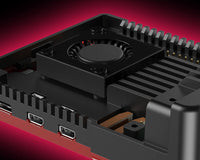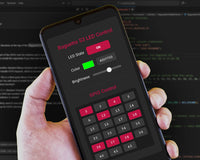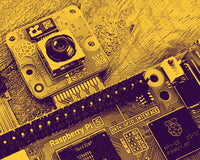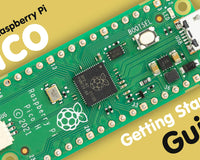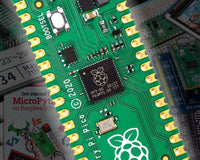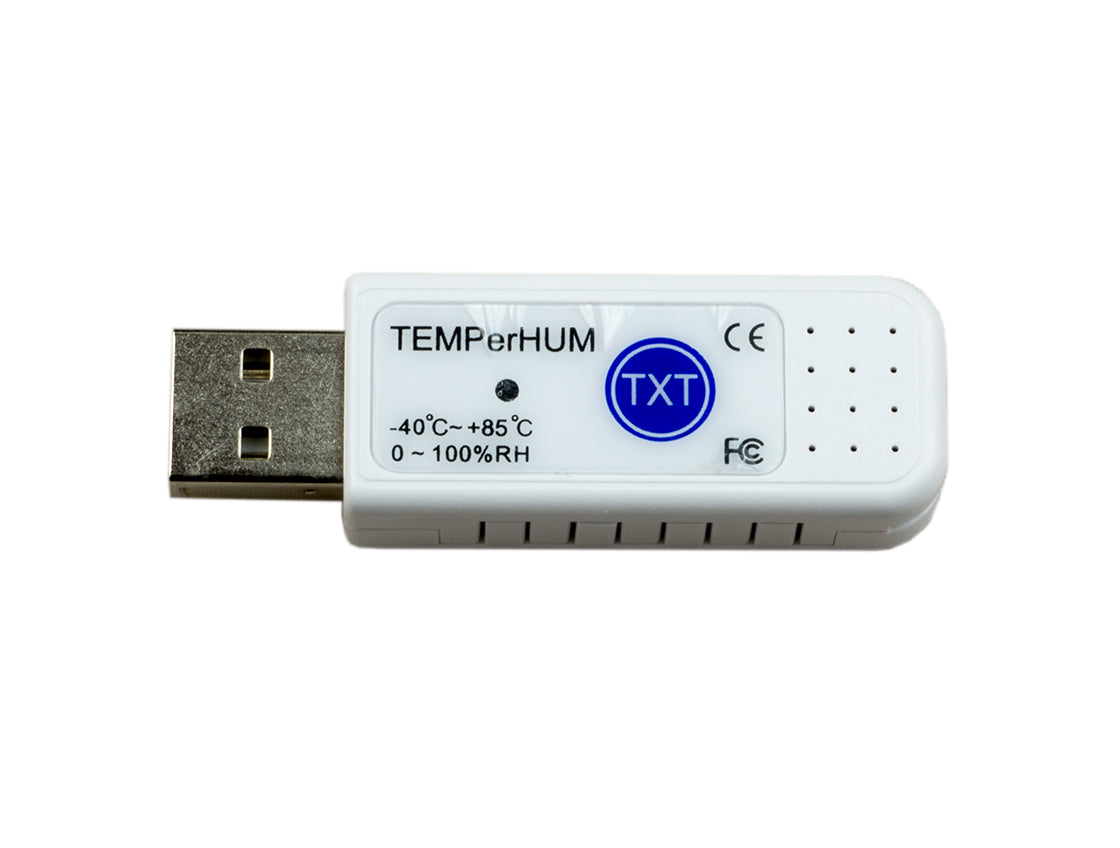
Testing PCsensor's TEMPerHUM Part 4 - Linux (Software Logging)
Testing PCsensor's “TEMPerHUM”
Phase 4: Testing PCsensor's “TEMPerHUM” in Linux environment
In Phase 3 we talked about using TEMPerHUM temperature & humidity sensor in Linux GUI (graphical user interface)(graphical user interface). Now for those of you who prefer Linux CLI (command line interface), it would be needed to produce (or as it is said in Linux terminology, to make) an appropriate executable file by yourself because Pcsensor company did not want (or planned) to offer any Linux equivalent for TEMPerHUM software for Windows. Solutions that we found on the web were based on various source code packages provided by individual programmers, and it was expected that the end-users would produce the program executables on their own machines. So let us start with that funny game:
Please note that we used again Linux Debian 7.11 (“Wheezy”), as we did in our previous Linux tests. In addition, we compiled the same program packages on different computer hardware (a desktop and a laptop) because of possible variations in operating system capabilities regarding different CPU type & speed, the amount of RAM memory, etc. (However, if it is not specified in a particular paragraph, only a desktop installation is described.)
1. Usb-thermometer (https://github.com/petechap/usb-thermometer)
Desktop installation: Compiling usb-thermometer was successful but as seen bellow useless. According to the instructions, you need to have libusb-dev software package already installed on your computer. My Debian 9.11 desktop installation did not have libusb-dev so I installed it from Debian software repository:
root@localhost:/usr/local/src/usb-thermometer-master# apt-get install libusb-dev Reading package lists... Done Building dependency tree Reading state information... Done The following packages were automatically installed and are no longer required: Use 'apt-get autoremove' to remove them. The following NEW packages will be installed: libusb-dev 0 upgraded, 1 newly installed, 0 to remove and 0 not upgraded. Need to get 40.8 kB of archives. After this operation, 239 kB of additional disk space will be used. Get:1 http://ftp.us.debian.org/debian/ wheezy/main libusb-dev i386 2:0.1.12-20+nmu1 [40.8 kB] Fetched 40.8 kB in 1min 48s (375 B/s) Selecting previously unselected package libusb-dev. (Reading database ... 319934 files and directories currently installed.) Unpacking libusb-dev (from .../libusb-dev_2%3a0.1.12-20+nmu1_i386.deb) ... Processing triggers for man-db ... Setting up libusb-dev (2:0.1.12-20+nmu1) ... root@localhost:/usr/local/src/usb-thermometer-master#
After installing libusb-dev, I executed make command:
root@localhost:/usr/local/src/usb-thermometer-master# make cc -DUNIT_TEST -o pcsensor pcsensor.c -lusb root@localhost:/usr/local/src/usb-thermometer-master# ./pcsensor Couldn't find the USB device, Exiting root@localhost:/usr/local/src/usb-thermometer-master#
Unfortunately, as shown in the last few lines above, the newly-built pcsensor executable did not return anything but an error message because it obviously expected the attached sensor hardware to be of the 'regular' USB type, which was not the case here (because this version of TEMPerHUM sensor was of so-called HID type, which meant it did not appear as a real USB device in Linux at all).
Laptop installation: Compiling usb-thermometer software package was successful but useless again. Before starting the compiling itself I ensured that my Debian 9.11 laptop installation was equipped with required libusb-dev software package: I used the APTonCD utility (installation disc creator for APT-cached packages) to transfer programs downloaded to the desktop machine (to avoid downloading them again over my slow dial-up access to the Internet).
root@localhost:/usr/local/src/usb-thermometer-master# make cc -DUNIT_TEST -o pcsensor pcsensor.c -lusb root@localhost:/usr/local/src/usb-thermometer-master# ./pcsensor Couldn't find the USB device, Exiting root@localhost:/usr/local/src/usb-thermometer-master#
As shown above, the sensor did not provide any output because the software expected the device to be a 'real' USB device while it was of the HID type.
2. TEMPered (https://github.com/edorfaus/TEMPered)
Desktop and laptop installation: To compile this software there were two prerequisites: HIDAPI library and CMake build system. The author of TEMPered had suggested to build HIDAPI library from sources on GitHub: https://github.com/signal11/hidapi so I did so. (See the next paragraph.)
2.1. HIDAPI (https://github.com/signal11/hidapi)
On its side, the HIDAPI author had suggested that for building his library it was needed to install development packages libudev, libusb and optionally Fox-toolkit (for the test GUI). On Debian/Ubuntu systems these packages can be installed by running:
sudo apt-get install libudev-dev libusb-1.0-0-dev libfox-1.6-dev
(On my Debian 7.11 desktop installation, that step required to download some 4.2 MB of material from Debian repositories, which also included some extra files not listed in the above apt-get install command. On my slow dial-up connectivity it took some 20min 13s. Note: I already had all of the above installed on my Debian 7.11 laptop installation, so the next step was skipped on the laptop.)
root@localhost:/home/misko# apt-get install libudev-dev libusb-1.0-0-dev libfox-1.6-dev Reading package lists... Done Building dependency tree Reading state information... Done The following extra packages will be installed: libcups2-dev libfox-1.6-0 libgl1-mesa-dev libglu1-mesa-dev libxcursor-dev libxfixes-dev mesa-common-dev x11proto-fixes-dev Suggested packages: libfox-1.6-doc The following NEW packages will be installed: libcups2-dev libfox-1.6-0 libfox-1.6-dev libgl1-mesa-dev libglu1-mesa-dev libudev-dev libusb-1.0-0-dev libxcursor-dev libxfixes-dev mesa-common-dev x11proto-fixes-dev 0 upgraded, 11 newly installed, 0 to remove and 0 not upgraded. Need to get 4,226 kB of archives. After this operation, 15.7 MB of additional disk space will be used. Do you want to continue [Y/n]? y Get:1 http://ftp.us.debian.org/debian/ wheezy/main libcups2-dev i386 1.5.3-5+deb7u6 [323 kB] Get:2 http://security.debian.org/ wheezy/updates/main libxfixes-dev i386 1:5.0-4+deb7u2 [23.3 kB] Get:3 http://ftp.us.debian.org/debian/ wheezy/main libcups2-dev i386 1.5.3-5+deb7u6 [323 kB] Get:4 http://ftp.us.debian.org/debian/ wheezy/main libfox-1.6-0 i386 1.6.45-1 [1,195 kB] Get:5 http://ftp.us.debian.org/debian/ wheezy/main mesa-common-dev i386 8.0.5-4+deb7u2 [277 kB] Get:6 http://ftp.us.debian.org/debian/ wheezy/main libgl1-mesa-dev i386 8.0.5-4+deb7u2 [32.7 kB] Get:7 http://ftp.us.debian.org/debian/ wheezy/main libglu1-mesa-dev i386 8.0.5-4+deb7u2 [220 kB] Get:8 http://ftp.us.debian.org/debian/ wheezy/main libudev-dev i386 175-7.2 [61.0 kB] Get:9 http://ftp.us.debian.org/debian/ wheezy/main libusb-1.0-0-dev i386 2:1.0.11-1 [185 kB] Get:10 http://ftp.us.debian.org/debian/ wheezy/main x11proto-fixes-dev all 1:5.0-2 [19.2 kB] Get:11 http://ftp.us.debian.org/debian/ wheezy/main libxcursor-dev i386 1:1.1.13-1+deb7u1 [33.8 kB] Get:12 http://ftp.us.debian.org/debian/ wheezy/main libfox-1.6-dev i386 1.6.45-1 [1,854 kB] Get:13 http://ftp.us.debian.org/debian/ wheezy/main libfox-1.6-dev i386 1.6.45-1 [1,854 kB] Get:14 http://ftp.us.debian.org/debian/ wheezy/main libfox-1.6-dev i386 1.6.45-1 [1,854 kB] Fetched 2,278 kB in 20min 13s (1,877 B/s) Selecting previously unselected package libcups2-dev. (Reading database ... 306320 files and directories currently installed.) Unpacking libcups2-dev (from .../libcups2-dev_1.5.3-5+deb7u6_i386.deb) ... Selecting previously unselected package libfox-1.6-0. Unpacking libfox-1.6-0 (from .../libfox-1.6-0_1.6.45-1_i386.deb) ... Selecting previously unselected package mesa-common-dev. Unpacking mesa-common-dev (from .../mesa-common-dev_8.0.5-4+deb7u2_i386.deb) ... Selecting previously unselected package libgl1-mesa-dev. Unpacking libgl1-mesa-dev (from .../libgl1-mesa-dev_8.0.5-4+deb7u2_i386.deb) ... Selecting previously unselected package libglu1-mesa-dev. Unpacking libglu1-mesa-dev (from .../libglu1-mesa-dev_8.0.5-4+deb7u2_i386.deb) ... Selecting previously unselected package libudev-dev. Unpacking libudev-dev (from .../libudev-dev_175-7.2_i386.deb) ... Selecting previously unselected package libusb-1.0-0-dev. Unpacking libusb-1.0-0-dev (from .../libusb-1.0-0-dev_2%3a1.0.11-1_i386.deb) ... Selecting previously unselected package x11proto-fixes-dev. Unpacking x11proto-fixes-dev (from .../x11proto-fixes-dev_1%3a5.0-2_all.deb) ... Selecting previously unselected package libxfixes-dev. Unpacking libxfixes-dev (from .../libxfixes-dev_1%3a5.0-4+deb7u2_i386.deb) ... Selecting previously unselected package libxcursor-dev:i386. Unpacking libxcursor-dev:i386 (from .../libxcursor-dev_1%3a1.1.13-1+deb7u1_i386.deb) ... Selecting previously unselected package libfox-1.6-dev. Unpacking libfox-1.6-dev (from .../libfox-1.6-dev_1.6.45-1_i386.deb) ... Processing triggers for man-db ... Setting up libcups2-dev (1.5.3-5+deb7u6) ... Setting up libfox-1.6-0 (1.6.45-1) ... Setting up mesa-common-dev (8.0.5-4+deb7u2) ... Setting up libgl1-mesa-dev (8.0.5-4+deb7u2) ... Setting up libglu1-mesa-dev (8.0.5-4+deb7u2) ... Setting up libudev-dev (175-7.2) ... Setting up libusb-1.0-0-dev (2:1.0.11-1) ... Setting up x11proto-fixes-dev (1:5.0-2) ... Setting up libxfixes-dev (1:5.0-4+deb7u2) ... Setting up libxcursor-dev:i386 (1:1.1.13-1+deb7u1) ... Setting up libfox-1.6-dev (1.6.45-1) ... update-alternatives: using /usr/bin/fox-config-1.6 to provide /usr/bin/fox-config (fox-config) in auto mode update-alternatives: using /usr/bin/reswrap-1.6 to provide /usr/bin/reswrap (reswrap) in auto mode root@localhost:/home/misko#
2.2. CMAKE
Desktop installation: For installing CMAKE, I used Synaptic Package Manager that besides cmake itself added cmake-data and emacsen-common, alltogether circa 6.2 MB to download. It took some additional 25 min or so to get those packages over my slow dial-up line. (By the way, for that task I could have also used my Debian 7.11 laptop, which I usually use for downloading anything bigger than 1 MB, and much faster by my university's Wi-Fi access, and what I later copy to the slow desktop computer with slow dial-up at home, but that particular day it was very rainy so I did not want to go outside and burden myself by getting wet in the academic campus.)
Laptop installation: I have already had all CMAKE stuff on the laptop. (In fact, I used all three CMAKE packages downloaded to the desktop above as the 'source-files' for the laptop's Synaptic Package Manager, so that I would not need to download them twice.)
The HIDAPI author has suggested that those users who had downloaded a source package from the website manually (i.e. if they did not run git clone), they can can skip the ./bootstrap step and go directly to the ./configure step. However that possibility did not work here properly:
root@localhost:/usr/local/src/hidapi-master# ./configure --enable-testgui --prefix=/usr/local bash: ./configure: No such file or directory
… so I performed ./bootstrap at first:
root@localhost:/usr/local/src/hidapi-master# ./bootstrap + autoreconf --install --verbose --force autoreconf: Entering directory `.' autoreconf: configure.ac: not using Gettext autoreconf: running: aclocal --force -I m4 autoreconf: configure.ac: tracing autoreconf: running: libtoolize --copy --force libtoolize: putting auxiliary files in `.'. libtoolize: copying file `./ltmain.sh' libtoolize: putting macros in AC_CONFIG_MACRO_DIR, `m4'. libtoolize: copying file `m4/libtool.m4' libtoolize: copying file `m4/ltoptions.m4' libtoolize: copying file `m4/ltsugar.m4' libtoolize: copying file `m4/ltversion.m4' libtoolize: copying file `m4/lt~obsolete.m4' autoreconf: running: /usr/bin/autoconf --force autoreconf: running: /usr/bin/autoheader --force autoreconf: running: automake --add-missing --copy --force-missing configure.ac:25: installing `./ar-lib' configure.ac:26: installing `./config.guess' configure.ac:26: installing `./config.sub' configure.ac:22: installing `./install-sh' configure.ac:22: installing `./missing' hidtest/Makefile.am: installing `./depcomp' autoreconf: Leaving directory `.' root@localhost:/usr/local/src/hidapi-master#
… after that I executed ./configure again:
root@localhost:/usr/local/src/hidapi-master# ./configure --enable-testgui --prefix=/usr/local checking for a BSD-compatible install... /usr/bin/install -c checking whether build environment is sane... yes checking for a thread-safe mkdir -p... /bin/mkdir -p checking for gawk... no checking for mawk... mawk checking whether make sets $(MAKE)... yes checking for style of include used by make... GNU checking for gcc... gcc checking whether the C compiler works... yes checking for C compiler default output file name... a.out checking for suffix of executables... checking whether we are cross compiling... no checking for suffix of object files... o checking whether we are using the GNU C compiler... yes checking whether gcc accepts -g... yes checking for gcc option to accept ISO C89... none needed checking dependency style of gcc... gcc3 checking for ar... ar checking the archiver (ar) interface... ar checking build system type... i686-pc-linux-gnu checking host system type... i686-pc-linux-gnu checking how to print strings... printf checking for a sed that does not truncate output... /bin/sed checking for grep that handles long lines and -e... /bin/grep checking for egrep... /bin/grep -E checking for fgrep... /bin/grep -F checking for ld used by gcc... /usr/bin/ld checking if the linker (/usr/bin/ld) is GNU ld... yes checking for BSD- or MS-compatible name lister (nm)... /usr/bin/nm -B checking the name lister (/usr/bin/nm -B) interface... BSD nm checking whether ln -s works... yes checking the maximum length of command line arguments... 1572864 checking whether the shell understands some XSI constructs... yes checking whether the shell understands "+="... yes checking how to convert i686-pc-linux-gnu file names to i686-pc-linux-gnu format... func_convert_file_noop checking how to convert i686-pc-linux-gnu file names to toolchain format... func_convert_file_noop checking for /usr/bin/ld option to reload object files... -r checking for objdump... objdump checking how to recognize dependent libraries... pass_all checking for dlltool... no checking how to associate runtime and link libraries... printf %s checking for archiver @FILE support... @ checking for strip... strip checking for ranlib... ranlib checking command to parse /usr/bin/nm -B output from gcc object... ok checking for sysroot... no checking for mt... mt checking if mt is a manifest tool... no checking how to run the C preprocessor... gcc -E checking for ANSI C header files... yes checking for sys/types.h... yes checking for sys/stat.h... yes checking for stdlib.h... yes checking for string.h... yes checking for memory.h... yes checking for strings.h... yes checking for inttypes.h... yes checking for stdint.h... yes checking for unistd.h... yes checking for dlfcn.h... yes checking for objdir... .libs checking if gcc supports -fno-rtti -fno-exceptions... no checking for gcc option to produce PIC... -fPIC -DPIC checking if gcc PIC flag -fPIC -DPIC works... yes checking if gcc static flag -static works... yes checking if gcc supports -c -o file.o... yes checking if gcc supports -c -o file.o... (cached) yes checking whether the gcc linker (/usr/bin/ld) supports shared libraries... yes checking whether -lc should be explicitly linked in... no checking dynamic linker characteristics... GNU/Linux ld.so checking how to hardcode library paths into programs... immediate checking whether stripping libraries is possible... yes checking if libtool supports shared libraries... yes checking whether to build shared libraries... yes checking whether to build static libraries... yes checking for gcc... (cached) gcc checking whether we are using the GNU C compiler... (cached) yes checking whether gcc accepts -g... (cached) yes checking for gcc option to accept ISO C89... (cached) none needed checking dependency style of gcc... (cached) gcc3 checking for g++... g++ checking whether we are using the GNU C++ compiler... yes checking whether g++ accepts -g... yes checking dependency style of g++... gcc3 checking how to run the C++ preprocessor... g++ -E checking for ld used by g++... /usr/bin/ld checking if the linker (/usr/bin/ld) is GNU ld... yes checking whether the g++ linker (/usr/bin/ld) supports shared libraries... yes checking for g++ option to produce PIC... -fPIC -DPIC checking if g++ PIC flag -fPIC -DPIC works... yes checking if g++ static flag -static works... yes checking if g++ supports -c -o file.o... yes checking if g++ supports -c -o file.o... (cached) yes checking whether the g++ linker (/usr/bin/ld) supports shared libraries... yes checking dynamic linker characteristics... (cached) GNU/Linux ld.so checking how to hardcode library paths into programs... immediate checking for gcc... gcc checking whether we are using the GNU Objective C compiler... no checking whether gcc accepts -g... no checking dependency style of gcc... gcc3 checking for pkg-config... /usr/bin/pkg-config checking pkg-config is at least version 0.9.0... yes checking whether make supports nested variables... yes checking operating system... i686-pc-linux-gnu (Linux back-end) checking for libudev... yes checking for clock_gettime in -lrt... yes checking for libusb... yes checking for the pthreads library -lpthreads... no checking whether pthreads work without any flags... no checking whether pthreads work with -Kthread... no checking whether pthreads work with -kthread... no checking for the pthreads library -llthread... no checking whether pthreads work with -pthread... yes checking for joinable pthread attribute... PTHREAD_CREATE_JOINABLE checking if more special flags are required for pthreads... no checking for PTHREAD_PRIO_INHERIT... no checking for fox... no checking for fox... yes configure: creating ./config.status config.status: creating pc/hidapi-hidraw.pc config.status: creating pc/hidapi-libusb.pc config.status: creating Makefile config.status: creating hidtest/Makefile config.status: creating libusb/Makefile config.status: creating linux/Makefile config.status: creating mac/Makefile config.status: creating testgui/Makefile config.status: creating windows/Makefile config.status: creating config.h config.status: executing depfiles commands config.status: executing libtool commands root@localhost:/usr/local/src/hidapi-master#
… there were no complaints so far, so I executed make:
root@localhost:/usr/local/src/hidapi-master# make make all-recursive make[1]: Entering directory `/usr/local/src/hidapi-master' Making all in linux make[2]: Entering directory `/usr/local/src/hidapi-master/linux' CC hid.lo CCLD libhidapi-hidraw.la make[2]: Leaving directory `/usr/local/src/hidapi-master/linux' Making all in libusb make[2]: Entering directory `/usr/local/src/hidapi-master/libusb' CC hid.lo CCLD libhidapi-libusb.la make[2]: Leaving directory `/usr/local/src/hidapi-master/libusb' Making all in hidtest make[2]: Entering directory `/usr/local/src/hidapi-master/hidtest' CXX hidtest.o CXXLD hidtest-libusb CXXLD hidtest-hidraw make[2]: Leaving directory `/usr/local/src/hidapi-master/hidtest' Making all in testgui make[2]: Entering directory `/usr/local/src/hidapi-master/testgui' CXX test.o CXXLD hidapi-hidraw-testgui CXXLD hidapi-libusb-testgui make[2]: Leaving directory `/usr/local/src/hidapi-master/testgui' make[2]: Entering directory `/usr/local/src/hidapi-master' make[2]: Nothing to be done for `all-am'. make[2]: Leaving directory `/usr/local/src/hidapi-master' make[1]: Leaving directory `/usr/local/src/hidapi-master' root@localhost:/usr/local/src/hidapi-master#
… no complaints there too, so I went to perform make install:
root@localhost:/usr/local/src/hidapi-master# make install
Making install in linux
make[1]: Entering directory `/usr/local/src/hidapi-master/linux'
make[2]: Entering directory `/usr/local/src/hidapi-master/linux'
/bin/mkdir -p '/usr/local/lib'
/bin/bash ../libtool --mode=install /usr/bin/install -c libhidapi-hidraw.la '/usr/local/lib'
libtool: install: /usr/bin/install -c .libs/libhidapi-hidraw.so.0.0.0 /usr/local/lib/libhidapi-hidraw.so.0.0.0
libtool: install: (cd /usr/local/lib && { ln -s -f libhidapi-hidraw.so.0.0.0 libhidapi-hidraw.so.0 || { rm -f libhidapi-hidraw.so.0 && ln -s libhidapi-hidraw.so.0.0.0 libhidapi-hidraw.so.0; }; })
libtool: install: (cd /usr/local/lib && { ln -s -f libhidapi-hidraw.so.0.0.0 libhidapi-hidraw.so || { rm -f libhidapi-hidraw.so && ln -s libhidapi-hidraw.so.0.0.0 libhidapi-hidraw.so; }; })
libtool: install: /usr/bin/install -c .libs/libhidapi-hidraw.lai /usr/local/lib/libhidapi-hidraw.la
libtool: install: /usr/bin/install -c .libs/libhidapi-hidraw.a /usr/local/lib/libhidapi-hidraw.a
libtool: install: chmod 644 /usr/local/lib/libhidapi-hidraw.a
libtool: install: ranlib /usr/local/lib/libhidapi-hidraw.a
libtool: finish: PATH="/usr/local/sbin:/usr/local/bin:/usr/sbin:/usr/bin:/sbin:/bin:/sbin" ldconfig -n /usr/local/lib
----------------------------------------------------------------------
Libraries have been installed in:
/usr/local/lib
If you ever happen to want to link against installed libraries
in a given directory, LIBDIR, you must either use libtool, and
specify the full pathname of the library, or use the `-LLIBDIR'
flag during linking and do at least one of the following:
- add LIBDIR to the `LD_LIBRARY_PATH' environment variable
during execution
- add LIBDIR to the `LD_RUN_PATH' environment variable
during linking
- use the `-Wl,-rpath -Wl,LIBDIR' linker flag
- have your system administrator add LIBDIR to `/etc/ld.so.conf'
See any operating system documentation about shared libraries for
more information, such as the ld(1) and ld.so(8) manual pages.
----------------------------------------------------------------------
/bin/mkdir -p '/usr/local/include/hidapi'
/usr/bin/install -c -m 644 ../hidapi/hidapi.h '/usr/local/include/hidapi'
make[2]: Leaving directory `/usr/local/src/hidapi-master/linux'
make[1]: Leaving directory `/usr/local/src/hidapi-master/linux'
Making install in libusb
make[1]: Entering directory `/usr/local/src/hidapi-master/libusb'
make[2]: Entering directory `/usr/local/src/hidapi-master/libusb'
/bin/mkdir -p '/usr/local/lib'
/bin/bash ../libtool --mode=install /usr/bin/install -c libhidapi-libusb.la '/usr/local/lib'
libtool: install: /usr/bin/install -c .libs/libhidapi-libusb.so.0.0.0 /usr/local/lib/libhidapi-libusb.so.0.0.0
libtool: install: (cd /usr/local/lib && { ln -s -f libhidapi-libusb.so.0.0.0 libhidapi-libusb.so.0 || { rm -f libhidapi-libusb.so.0 && ln -s libhidapi-libusb.so.0.0.0 libhidapi-libusb.so.0; }; })
libtool: install: (cd /usr/local/lib && { ln -s -f libhidapi-libusb.so.0.0.0 libhidapi-libusb.so || { rm -f libhidapi-libusb.so && ln -s libhidapi-libusb.so.0.0.0 libhidapi-libusb.so; }; })
libtool: install: /usr/bin/install -c .libs/libhidapi-libusb.lai /usr/local/lib/libhidapi-libusb.la
libtool: install: /usr/bin/install -c .libs/libhidapi-libusb.a /usr/local/lib/libhidapi-libusb.a
libtool: install: chmod 644 /usr/local/lib/libhidapi-libusb.a
libtool: install: ranlib /usr/local/lib/libhidapi-libusb.a
libtool: finish: PATH="/usr/local/sbin:/usr/local/bin:/usr/sbin:/usr/bin:/sbin:/bin:/sbin" ldconfig -n /usr/local/lib
----------------------------------------------------------------------
Libraries have been installed in:
/usr/local/lib
If you ever happen to want to link against installed libraries
in a given directory, LIBDIR, you must either use libtool, and
specify the full pathname of the library, or use the `-LLIBDIR'
flag during linking and do at least one of the following:
- add LIBDIR to the `LD_LIBRARY_PATH' environment variable
during execution
- add LIBDIR to the `LD_RUN_PATH' environment variable
during linking
- use the `-Wl,-rpath -Wl,LIBDIR' linker flag
- have your system administrator add LIBDIR to `/etc/ld.so.conf'
See any operating system documentation about shared libraries for
more information, such as the ld(1) and ld.so(8) manual pages.
----------------------------------------------------------------------
/bin/mkdir -p '/usr/local/include/hidapi'
/usr/bin/install -c -m 644 ../hidapi/hidapi.h '/usr/local/include/hidapi'
make[2]: Leaving directory `/usr/local/src/hidapi-master/libusb'
make[1]: Leaving directory `/usr/local/src/hidapi-master/libusb'
Making install in hidtest
make[1]: Entering directory `/usr/local/src/hidapi-master/hidtest'
make[2]: Entering directory `/usr/local/src/hidapi-master/hidtest'
make[2]: Nothing to be done for `install-exec-am'.
make[2]: Nothing to be done for `install-data-am'.
make[2]: Leaving directory `/usr/local/src/hidapi-master/hidtest'
make[1]: Leaving directory `/usr/local/src/hidapi-master/hidtest'
Making install in testgui
make[1]: Entering directory `/usr/local/src/hidapi-master/testgui'
make[2]: Entering directory `/usr/local/src/hidapi-master/testgui'
/bin/mkdir -p '/usr/local/bin'
/bin/bash ../libtool --mode=install /usr/bin/install -c hidapi-hidraw-testgui hidapi-libusb-testgui '/usr/local/bin'
libtool: install: /usr/bin/install -c .libs/hidapi-hidraw-testgui /usr/local/bin/hidapi-hidraw-testgui
libtool: install: /usr/bin/install -c .libs/hidapi-libusb-testgui /usr/local/bin/hidapi-libusb-testgui
make[2]: Nothing to be done for `install-data-am'.
make[2]: Leaving directory `/usr/local/src/hidapi-master/testgui'
make[1]: Leaving directory `/usr/local/src/hidapi-master/testgui'
make[1]: Entering directory `/usr/local/src/hidapi-master'
make[2]: Entering directory `/usr/local/src/hidapi-master'
make[2]: Nothing to be done for `install-exec-am'.
/bin/mkdir -p '/usr/local/share/doc/hidapi'
/usr/bin/install -c -m 644 README.txt AUTHORS.txt LICENSE-bsd.txt LICENSE-gpl3.txt LICENSE-orig.txt LICENSE.txt '/usr/local/share/doc/hidapi'
/bin/mkdir -p '/usr/local/lib/pkgconfig'
/usr/bin/install -c -m 644 pc/hidapi-hidraw.pc pc/hidapi-libusb.pc '/usr/local/lib/pkgconfig'
make[2]: Leaving directory `/usr/local/src/hidapi-master'
make[1]: Leaving directory `/usr/local/src/hidapi-master'
root@localhost:/usr/local/src/hidapi-master#
… no complaints there too ...
root@localhost:/usr/local/src/hidapi-master# cd linux root@localhost:/usr/local/src/hidapi-master/linux# make -f Makefile-manual g++ -Wall -g hid.o ../hidtest/hidtest.o `pkg-config libudev --libs` -lrt -o hidtest-hidraw cc -Wall -g `pkg-config libudev --libs` -lrt -shared -fpic -Wl,-soname,libhidapi-hidraw.so.0 hid.o -o libhidapi-hidraw.so root@localhost:/usr/local/src/hidapi-master/linux#
(The above two actions produced hidtest-hidraw executable.)
root@localhost:/usr/local/src/hidapi-master/linux# cd .. root@localhost:/usr/local/src/hidapi-master# cd testgui root@localhost:/usr/local/src/hidapi-master/testgui# make -f Makefile-manual g++ -Wall -g ../libusb/hid.o test.o -ludev -lrt -lpthread `fox-config --libs` `pkg-config libusb-1.0 --libs` -o testgui root@localhost:/usr/local/src/hidapi-master/testgui#
(The above three steps produced testgui executable.)
… now I wanted to perform some tests with HIDAPI software:
root@localhost:/usr/local/src/hidapi-master/hidtest# ./hidtest-hidraw Device Found type: 0c45 7402 path: /dev/hidraw0 serial_number: Manufacturer: RDing Product: TEMPer1F_H1_V1.4 Release: 1 Interface: 0 Device Found type: 0c45 7402 path: /dev/hidraw1 serial_number: Manufacturer: RDing Product: TEMPer1F_H1_V1.4 Release: 1 Interface: 1 unable to open device root@localhost:/usr/local/src/hidapi-master/hidtest# ./hidtest-libusb Device Found type: 0c45 7402 path: 0003:002e:00 serial_number: (null) Manufacturer: RDing Product: TEMPer1F_H1_V1.4 Release: 1 Interface: 0 Device Found type: 0c45 7402 path: 0003:002e:01 serial_number: (null) Manufacturer: RDing Product: TEMPer1F_H1_V1.4 Release: 1 Interface: 1 unable to open device root@localhost:/usr/local/src/hidapi-master/hidtest#
… then I tried the following (changed the directory):
root@localhost:/usr/local/src/hidapi-master/hidtest# cd .. root@localhost:/usr/local/src/hidapi-master# cd linux root@localhost:/usr/local/src/hidapi-master/linux# ./hidtest-hidraw Device Found type: 0c45 7402 path: /dev/hidraw0 serial_number: Manufacturer: RDing Product: TEMPer1F_H1_V1.4 Release: 1 Interface: 0 Device Found type: 0c45 7402 path: /dev/hidraw1 serial_number: Manufacturer: RDing Product: TEMPer1F_H1_V1.4 Release: 1 Interface: 1 unable to open device root@localhost:/usr/local/src/hidapi-master/linux#
… then I tried this (changed the directory again):
root@localhost:/usr/local/src/hidapi-master/linux# cd .. root@localhost:/usr/local/src/hidapi-master# cd testgui root@localhost:/usr/local/src/hidapi-master/testgui# ./testgui
… and it finally opened this window:

… then I tried connection to the first device listed (although both seemed the same):

… then I tried to “Send Output Report” (did not return anything back), following by “Send Feature Report” (it just closed that window prematurely), then re-opened that GUI again, following by “Get Feature Report” that returned some bytes see bellow:

… that was all with that GUI. (Connecting to the second device listed was possible but sending/receiving reports failed with some unclear error messages.)
Well, I got back to work with TEMPered package again:
root@localhost:/usr/local/src/hidapi-master/testgui# cd /usr/local/src/TEMPered-master root@localhost:/usr/local/src/TEMPered-master# root@localhost:/usr/local/src/TEMPered-master# make This

